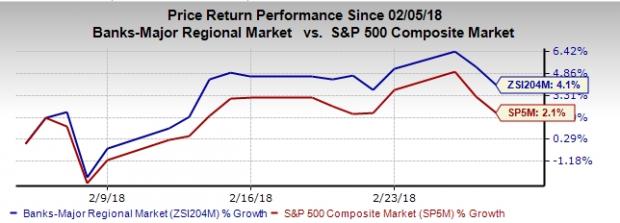Over the last five trading days, volatility in the stock market affected the banking stocks as well. The Fed Chair Jerome Powell’s congressional testimony dominated, wherein he presented an optimistic picture of the U.S. economy. This view hints at a rise in inflation, which will give the Fed all the more reason to take a hawkish stance in raising interest rates.
Additionally, growth in the economy, low unemployment rate and strong consumer sentiment will drive the demand for loans and other related products of banks. These will support banks’ financials though the markets seem to be wary of such a scenario. Hence, this led to significant volatility and bank stocks’ performance turned bearish over the last five trading sessions.
Driven by the Fed’s upbeat view on the economy, mortgage rates were also on an upswing with 30-year mortgages averaging 4.43% (highest in more than four years). However, homeowners seeking lower rates for refinancing are definitely big-time losers. A rise in mortgage rates will limit refinancing activity.
Coming to company-specific news related to banks, business misconduct continued to dominate headlines. On the other hand, banks seem to be optimistic about gains from improving economy.
Further, Federal Deposit Insurance Corp. (FDIC)-insured commercial banks and savings institutions reported fourth-quarter 2017 earnings of $42.2 billion, down 2.3% year over year. Results were adversely impacted by elevated income taxes, higher non-interest expenses and loan loss provisions.

(Read: Bank Stock Roundup for the week ending Feb 23, 2018)
Important Developments of the Week
1. Citigroup (C) plans to refund about $330 million to its credit card customers by the latter half of this year, after having confessed to charging higher interest rates to some of the defaulters, since 2011. The bank discovered to have kept overcharging about 1.75 million accounts. (Read more: Citi to Make Refunds for Overcharging Credit Card Customers)











Leave A Comment